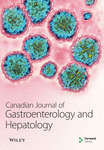Open Trial of Cyclosporine in Patients with Severe Active Crohn′s Disease Refractory to Conventional Therapy
Abstract
Fifteen patients with severe active Crohn′s disease, refractory to conventional therapy, were given a 16 week course of cyclosporine ar an initial oral daily dose of 10 mg/kg, adjusted to maintain cyclosporine scrum trough levels between 100 and 200 ng/ml. Five patients withdrew early because of side effects, poor absorption or noncompliance. T he remaining 10 patients all improved within four weeks as measured by three different clinical indices: Crohn′s Disease Activity Index, Simple Index of Crohn′s Disease Activity and Mean Score of Therapeutic Goals (MSTG). Seven patients maintained this initial improvement and prednisone was either reduced or discontinued. Four of these seven patients relapsed with in four weeks of stopping cyclosporine, and three remain in remission after 75 ± 2 weeks. Side effects were minor and easily reversible. When the various clinical and laboratory indices were compared, MSTG was found to be the most useful index for the assessment of therapy. Cyclosporine appears to be a safe and effective therapy in patients with severe active Crohn′s disease refractory to conventional therapy.




